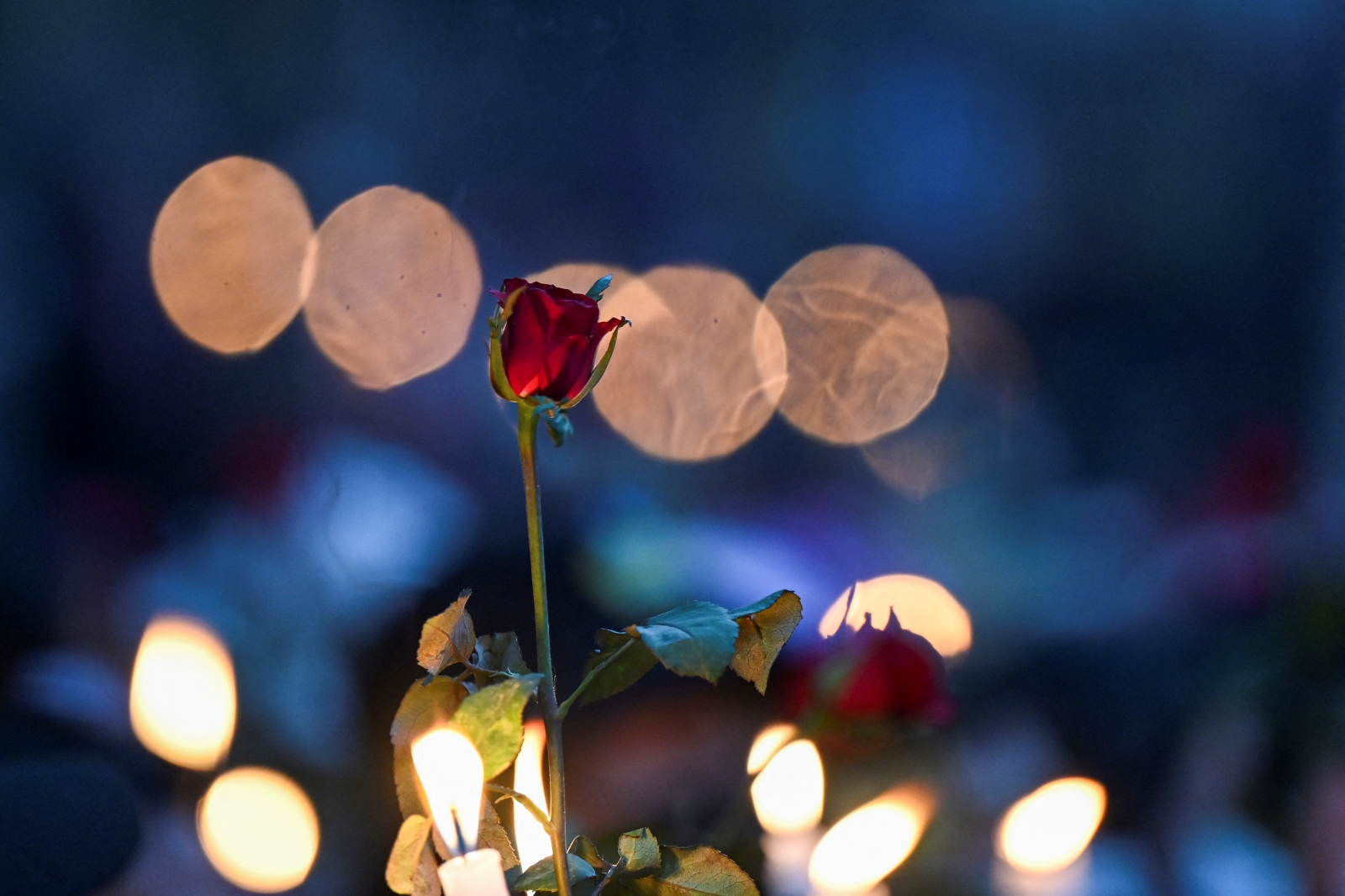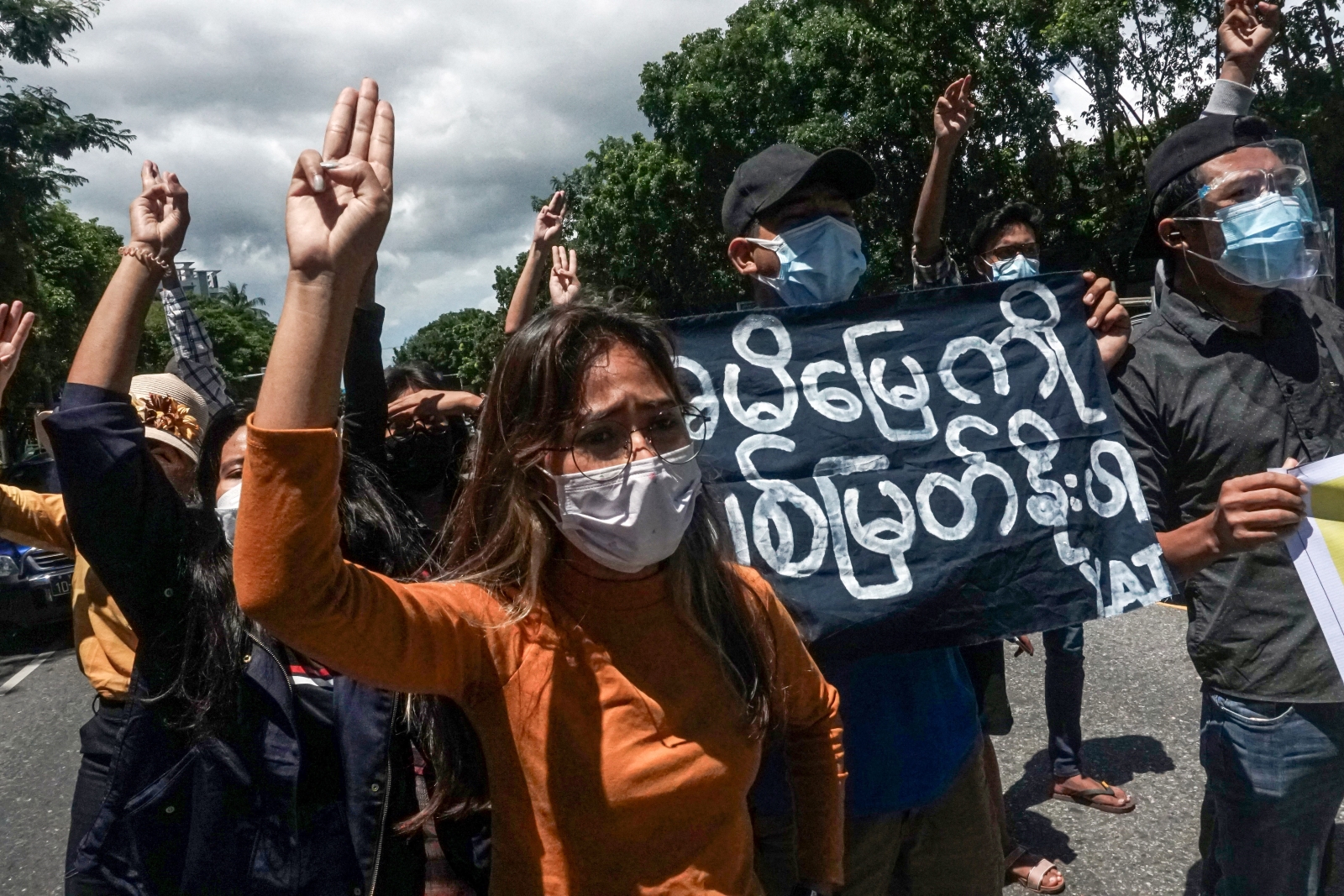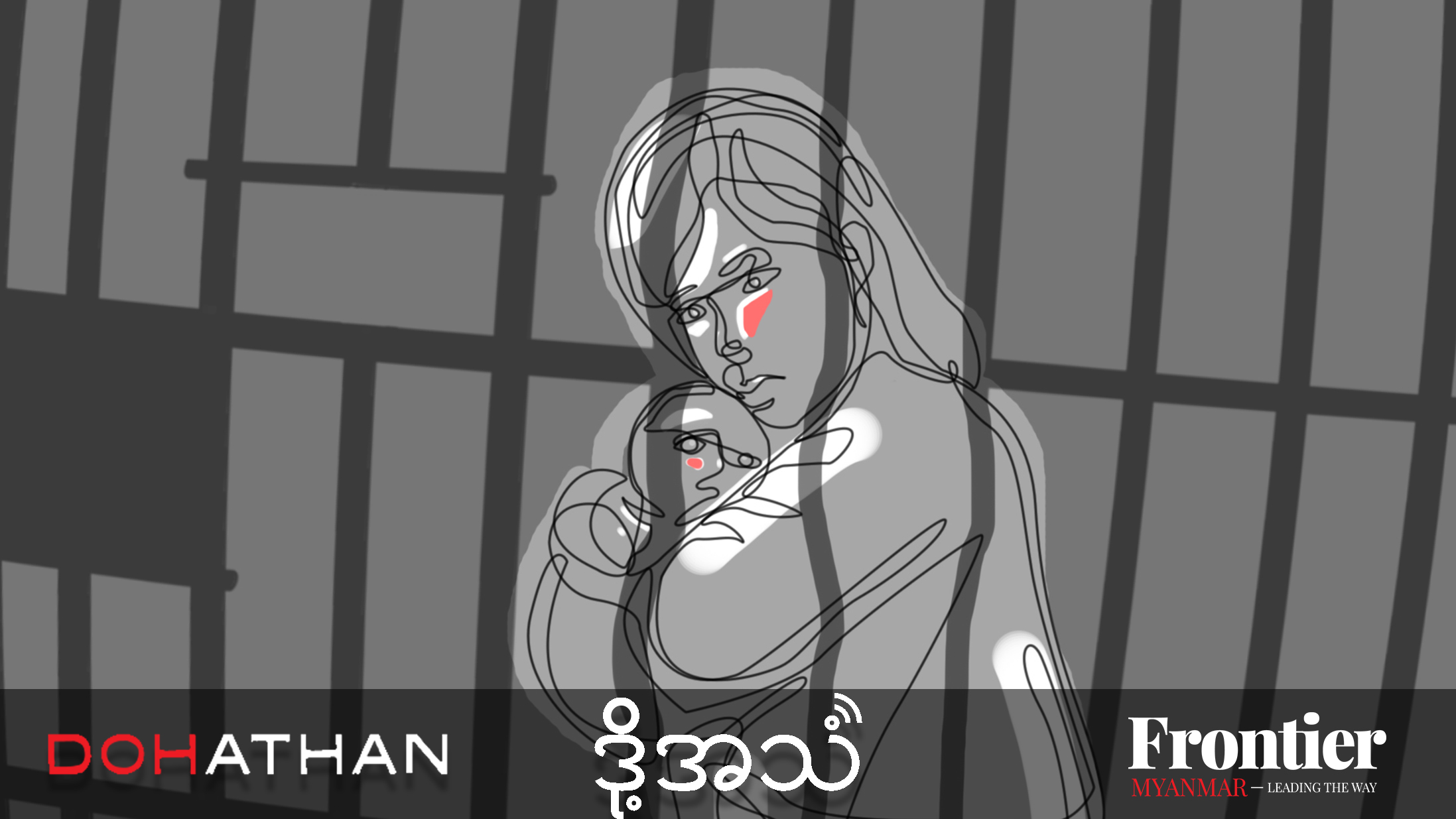Journalists Wa Lone and Kyaw Soe Oo have walked free, but Aung San Suu Kyi’s decision to shield a broken judiciary came at the cost of a core National League for Democracy ideal.
By BEN DUNANT | FRONTIER
IN THE eyes of most judges and court officials, “if people are brought before the courts, it’s because they’ve committed some crime,” said lawyer Daw Zar Li Aye, speaking to Frontier at her office in Yangon. In a judicial system still beholden to the law-and-order mindset that characterised five decades of military rule, guilt, rather than innocence, is often presumed of those unlucky enough to be brought before it.
As Dr Nick Cheesman argued in his 2015 book, Opposing the Rule of Law, those marked as “public enemies” in Myanmar pass through an “administrative continuum” that, however protracted, reliably takes them from the police station through the courtroom to the prison cell. Many actors must play their part – the police officer who extracts a dubious confession through violence, the judge who is content to overlook weeks of detention suffered by the defendant without access to a family or a lawyer, and the advocate whose job is not to defend but to negotiate a more lenient sentence for their client. These efforts combine towards an aim, not of justice, but of securing public tranquillity and orderliness, Cheesman wrote.
Reuters journalists Ko Wa Lone, 33, and Ko Kyaw Soe Oo, 29, had taken their own “administrative” journey through the courts before emerging from prison on May 7. On that day, they were freed by President U Win Myint (at the behest of State Counsellor Daw Aung San Suu Kyi) along with thousands of other inmates in the mass pardon that traditionally marks the New Year festival of Thingyan.
The shambolic nature of their trial in Yangon’s Northern District Court, which ended in September when they each received seven-year sentences under the Official Secrets Act, was interpreted by the media as evidence of how politically motivated their case was; but it was a shock only to those unfamiliar with Myanmar’s courts. A 2017 report by UK-based organisation Justice Base found that among many routine violations of fair trial rights, in 135 out of 155 observed cases in Yangon courts “the defendant did not receive legal representation until the first day of the inquiry stage or later”, meaning lawyers were absent even during remand hearings.
Support more independent journalism like this. Sign up to be a Frontier member.
Before she became the de facto head of the civilian government, Aung San Suu Kyi was forthright about deficiencies in the court system. As an opposition figure, she told a public meeting in Bago in 2013 that “99 percent” of people in Myanmar “don’t believe in the courts” and that reform of the judiciary was an urgent need.
The National League for Democracy government that took office in 2016 has placed some emphasis on judicial reform. The Supreme Court published a Code of Ethics for judges in 2017 and in the following year the Office of the Attorney General published a Fair Trial Guidebook for law officers, as state prosecutors are called.
Win Myint, who became president in March last year, has signalled a personal interest in improving the judiciary. The former high court advocate conveyed this in a widely publicised meeting with the chief justice of the Supreme Court, U Htun Htun Oo, within days of becoming president. After a murder case concerning the fatal beating of comedian Ko Aung Yell Htwe was thrown out of the Yangon Eastern District Court in July last year, prompting a public outcry, Win Myint ordered Attorney General U Tun Tun Oo and the Anti-Corruption Commission to investigate.
The ACC uncovered evidence of bribery in the scuppering of the murder trial, prompting a high profile trial of judicial officials for corruption, and the Yangon Region High Court in September ordered a retrial of the murder case at the district court, which continues. This was a government, it seemed, that was aware of the shortcomings of the courts and was not shy of calling out blatant miscarriages of justice.
The president exercised a more familiar form of intervention in the three mass pardons following Thingyan that freed more than 23,000 inmates of Myanmar’s overcrowded prisons. Most had been serving sentences for drug offences, but the sight of press freedom heroes Wa Lone and Kyaw Soe Oo walking free from the gates of Yangon’s Insein Prison in the third and final pardon, after more than 500 days behind bars, dominated the news. Their reporting had exposed an army-led massacre in September 2017 of 10 Rohingya men and boys in a village of northern Rakhine State. The military later admitted to the killings, but the government prosecuted them as spies on the grounds that they had obtained classified documents.
The absurdities of their eight-month trial included a police witness claiming to have burnt the report documenting their arrest, for no reason that he was able to give, and another police witness for the prosecution, Captain Moe Yan Naing, blowing the whistle in court and telling the judge that he and other officers had been ordered by a senior to entrap Wa Lone with planted documents. But the district judge U Ye Lwin disregarded these and other discrepancies, and the seven-year sentences he handed down were upheld on appeal at the Yangon Region High Court and later the Supreme Court in Nay Pyi Taw.
The case involving the Reuters journalists had one striking parallel with the Rohingya crisis that they had reported on: the Tatmadaw had taken ruthless action before stepping back and allowing Aung San Suu Kyi and her civilian administration to handle the domestic and international fallout, as well as the responsibility for remedying (or furthering) the damage.
Wa Lone and Kyaw Soe Oo were arrested – seemingly through entrapment – by a police force that is under the military-controlled Ministry of Home Affairs. The police investigation was signed off within hours of their arrest by the military-aligned vice president U Myint Swe while the then-president, U Htin Kyaw, was overseas. However, after being detained incommunicado for two weeks at an unknown location, they were presented before court and entered the domain of the civilian government.
Although news reports often describe the military as “suing” journalists and activists that displease them, the soldiers and police officers under its command can only arrest, detain and file criminal complaints against them; thereafter, law officers must pursue charges in court. These prosecutors are not under any military-controlled office but answer to the attorney general, who is appointed by the president. The criminal procedure code empowers law officers to refuse or withdraw cases at any time if they are found not to be in the public interest, or if the evidence is flimsy. Although the military retains substantial power to intimidate officials and to influence outcomes, the cooperation of core elements of the civilian government – willing or otherwise – is required to put its enemies in prison.
These basic features of the court system were obscured by the way that Aung San Suu Kyi and others in her government responded to the intense international pressure for the release of Wa Lone and Kyaw Soe Oo, in which the line was consistently one of “non-interference” with the judiciary. Leaving aside the question of how the government can credibly claim detachment from the case when it is bringing charges through state prosecutors, the non-interference line provided Aung San Suu Kyi with a defence for keeping journalists behind bars that was at least superficially consistent with the NLD’s long-standing “rule of law” platform.

State Counsellor Daw Aung San Suu Kyi said at the World Economic Forum in Hanoi on September 13 that the sentencing of the Reuters journalists had “nothing to do with freedom of expression at all”. (AFP)
In public, Aung San Suu Kyi defended their imprisonment in narrow legal terms that presupposed competence in a judiciary that she had previously disparaged. On September 13, 10 days after they were sentenced, she told the audience at the World Economic Forum in Hanoi that the two were in prison because “the court has decided that they had broken the Official Secrets Act”. She also doubted aloud whether critics of the trial had actually read the judgement, which she said had “nothing to do with freedom of expression at all”.
A Western diplomatic source speaking on condition of anonymity told Frontier that, during meetings with foreign dignitaries who pushed her on the subject, Aung San Suu Kyi had framed her refusal to intervene in their trial as a necessary departure from the old way of doing things, when Myanmar’s military rulers would routinely meddle in the courts. The courts, however flawed, must be given space to breathe if the rule of law is to flourish in Myanmar, the argument went.
Domestic advocates for the journalists’ release received similar answers. Ko Tha Lun Zaung Htet, a joint secretary of the Myanmar Press Council and editor-in-chief of Khit Thit Media, said he presented imploring letters from the wives of Wa Lone and Kyaw Soe Oo to Win Myint during a dinner reception in Nay Pyi Taw on November 23 to inaugurate the newly elected Press Council. Tha Lun Zaung Htet told Frontier that when he personally requested the president’s help in releasing the journalists, Win Myint responded that he was personally sympathetic but, at the insistence of Aung San Suu Kyi, would not act while the judicial process continued, referencing the appeal that was then before the Yangon Region High Court.
The judicial process climaxed in the Supreme Court’s decision to uphold the convictions on April 23, just two weeks before the journalists were pardoned. Although the journalists’ legal team could have appealed for another Supreme Court review, it received an indirect tip from the government that any such move might preclude the journalists’ release in the third and final Thingyan mass pardon, a journalist who acted as an intermediary told Frontier on condition of anonymity.
For all the talk of breaking with bad legacies, the case culminated in a way that was strikingly consistent with the past practices of military rule – with an executive act of remission, carried out on “humanitarian” grounds, after a trial in which glaring inconsistencies and evidence of police abuse were disregarded, guilt was established up to the highest level and no fault was conceded by the government.
Lawyer U Khin Maung Zaw, who represented Wa Lone and Kyaw Soe Oo throughout their trial, said the manner of their release gave little comfort to other journalists or those concerned with the public’s right to information. “We thank the president for his leniency, but the decision of the Supreme Court and other judges is not satisfactory. Their guilt has not been erased,” he told Frontier. “A precedent has been set for other journalists to be charged like this.”
Those sympathetic to Aung San Suu Kyi’s position would argue that the pardon was the only device open to the NLD government in a case that had been brought to the courts by the military-controlled police force, and in which the military likely retained a strong interest given the journalists’ work in exposing their crimes. Many would say that the power that the constitution and the criminal procedure code grants to the attorney general’s office and its law officers to end sham trials and refuse malicious complaints is a fiction in cases where the military has a score to settle.
This is plausible in a country where the military’s power and influence extend well beyond the constitutional lines that it drew for itself, and where the NLD government must feel its way through a delicate power-sharing arrangement with the military. Moreover, with little governing experience to fall back on, the NLD has appointed former military officers to senior civilian positions. The attorney general himself, who served as deputy attorney general under President U Thein Sein, is a former army major general, according to a profile of “the NLD’s military-linked leaders” published by Myanmar Now.
However, lawyers and legal experts who spoke to Frontier said that the ease with which the military gets its way in court cases has more to do with conditioning than actual power relations. Khin Maung Zaw said that after decades of militarised justice, “most prosecutors think that, if they receive a case, they have to prosecute it; that only then have they done their job”. He said, “the law officers are not under the control of the military, but many of them still think along military lines”.
The pivotal role that the attorney general’s office ought to play, in assessing whether criminal complaints have evidence or are in the public interest before prosecuting them, is repeatedly denied or obscured in practice. Zar Li Aye said that the diminutive status of law officers is rooted in informal notions of hierarchy carried over from the era of military rule. These notions configure the police officer as someone to be meekly obeyed, rather than someone’s whose conduct is to be subjected to legal scrutiny. Referring to training workshops she had conducted for law officers, she said it was a challenge to persuade them that they should rightly be “the boss” in any encounter with a police officer bringing a case to court.
It will take time to transform these attitudes and practices, but they will stay put in the absence of political will at the top. It would take a brave law officer (or judge) to find fault with, let alone refuse, a complaint filed by a senior army officer. This is why, if the government is serious about establishing the rule of law, it needs to encourage its own legal staff not to prosecute cases that have no legal merit, or that undermine democracy, and reassure them they will be properly backed in doing so.
But, most of all, the NLD government should stop hiding behind principles of non-interference in judicial affairs when travesties of justice are credibly reported. Instead, it ought to acknowledge that the government is necessarily a party to any case brought against an alleged criminal and therefore has a responsibility to ensure that they are pursued in the public interest. Wa Lone and Kyaw Soe Oo are finally free, but their case never should have gone to trial.







